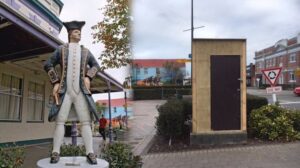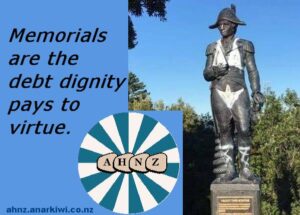1869: Marton
June 23, 2021
By AHNZ
 The town of Marton came by its name on 24 February, 1869, when its Settlers met to make the big decision. The other names that were not chosen were: York, Edinburgh, Carleton, Cokham, and Stafford after the Premier of the day. Marton was picked in remembrance to the centenary year of Captain James Cook first visiting New Zealand in October 1769 and, in particular, his birthplace of Marton, Yorkshire. None of those other names ever came to be used except for ‘Stafford’ on the West Coast.
The town of Marton came by its name on 24 February, 1869, when its Settlers met to make the big decision. The other names that were not chosen were: York, Edinburgh, Carleton, Cokham, and Stafford after the Premier of the day. Marton was picked in remembrance to the centenary year of Captain James Cook first visiting New Zealand in October 1769 and, in particular, his birthplace of Marton, Yorkshire. None of those other names ever came to be used except for ‘Stafford’ on the West Coast.
Edward Stafford and William Fox were great rivals, both Premiers and cunning politicians. Marton was the home ground of Fox and they read the recently established Wanganui Herald of John Ballance. Things were taking off for Marton because it was not a government-planned settlement but a private one. The founding fathers were Morris, Morris, Follett, and Signal.
“Four settlers, Charles Follett, Robert Signal, and Thomas and Richard Morris, who were the owners of three 60-acre sections near the accommodation house, subdivided their properties into town lots and sold them for a private township in 1866. The first section to be subdivided and sold was that belonging to Signal. ” – McLintock (1966)
“Sadly, our monuments have been treated cruelly as I write this. In Hamilton the statue of Hamilton was torn out to appease the mob. In Marton, Captain Cook has been encased in a protective box. In Auckland, George Gray has been despoiled with blood-red paint. In Invercargill, Wisdom remains in a body bag. The offence of these ancestors of ours is apparently that they didn’t come far enough fast enough.” – Generational Accretion, AHNZ
“The dominant trend may not, in fact, express the soul of an entire people; it may be rejected, resented or ignored by an overwhelming majority; but if it is the dominant voice of a given period, this tells us something about the state of the people’s souls.”- Ayn Rand
 ‘Stafford’ was never going to beat ‘Marton’ for these Settlers as a replacement name for Tutaenui’. The Maori name has long been understood to translate to ‘dung heap’ but modern revisionism seeks to make out otherwise (perhaps to help Treaty claims along?) Stafford was on the outs and Fox himself would be the next Premier of New Zealand (again.) I strongly suspect that the founders’ speculation was made to pay by a government-made bridge at taxpayers’ expense delivered by political patron Fox. That’s how these things usually go.
‘Stafford’ was never going to beat ‘Marton’ for these Settlers as a replacement name for Tutaenui’. The Maori name has long been understood to translate to ‘dung heap’ but modern revisionism seeks to make out otherwise (perhaps to help Treaty claims along?) Stafford was on the outs and Fox himself would be the next Premier of New Zealand (again.) I strongly suspect that the founders’ speculation was made to pay by a government-made bridge at taxpayers’ expense delivered by political patron Fox. That’s how these things usually go.
 Being so closely associated with Captain Cook and having his statue (c.2005) prominently in public created a civil conundrum for Martin in 2020. By strange twist of culture we had gone from protecting public property to accommodating those who sought to attack it. In Hamilton, for example, an offending statue was removed by the government on behalf of vandals to facilitate their process! Hamilton’s politicians quickly followed this act up by paying mainstream historian Vincent O’Malley (left) $10,000 to character assassinate independently report on 4 targeted figures in New Zealand history (Ref. 2020: Historical Report on Hamilton Street and City Names, AHNZ.)
Being so closely associated with Captain Cook and having his statue (c.2005) prominently in public created a civil conundrum for Martin in 2020. By strange twist of culture we had gone from protecting public property to accommodating those who sought to attack it. In Hamilton, for example, an offending statue was removed by the government on behalf of vandals to facilitate their process! Hamilton’s politicians quickly followed this act up by paying mainstream historian Vincent O’Malley (left) $10,000 to character assassinate independently report on 4 targeted figures in New Zealand history (Ref. 2020: Historical Report on Hamilton Street and City Names, AHNZ.)—
Note: I contradict mainstream history (as per usual) in saying Marton was named on 24 February 1869. Wikipedia and Project Marton. My date is based off primary sources, the Wellington Independent and Wanganui Herald. ‘Marton’ is also mentioned in official documents prior to October 1869.
Ref. “This October marks 150 years since Marton was named. To celebrate this occasions on October 5th the history of Marton will be shared” – Project Marton, Facebook (2019)
Ref. “In 1869 local citizens changed the name to Marton to honour the birthplace of Captain James Cook in Middlesbrough, marking his landing in New Zealand exactly 100 years earlier.”- Wikipedia (2021)
This repeated error probably stems from the opening of Martin Hall later in 1869 opened by William Fox who used similar words.
Image ref. Captain Cook statue covered up in Rangitīkei town of Marton, TVNZ (2020)
Image ref. Captain Cook vandalism in Gisborne (2018)
Note: For the 250th anniversary of Cook’s visit this statue was torn out entirely
 Like Comment Share
Like Comment Share





